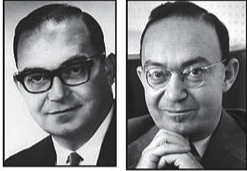March 6, 2024

The brothers White: Robert, left, and Theodore.
As our world wrestles with the impact of climate change, The National Oceanic and Atmospheric Administration (NOAA) has emerged as the most important government agency for tracking, predicting, and communicating environmental changes. NOAA contains the agencies that monitor and predict weather, protect the ocean and fisheries, and combine the scientific and technological departments related to our atmosphere and oceans. Locally, NOAA has offices and ships in Woods Hole on Cape Cod, where it also operates a small aquarium for visitors.
NOAA’s founding administrator was Dr. Robert M. White, who grew up on Erie Street in the Four Corners neighborhood of Dorchester. Though celebrated in his day, Dr. White has been largely forgotten, even inside NOAA. I came upon the fact that he was founding director of NOAA when I was re-reading Theodore “Teddy” White’s 1978 autobiography, “In Search of History,” which starts with a chapter on growing up in Dorchester in the 1920s.
White describes Dorchester as an “ethnic ballet” of the various groups that then lived here. It’s great history, relevant today in explaining the demographic patterns of the neighborhood today. Anyone who loves Dorchester history will enjoy that chapter.
Teddy White, who became a major American journalist, historian, pundit, and a confidant of the Kennedys (he was asked by Jackie Kennedy following the assassination of JFK to refer to the Kennedy Administration as “Camelot”) is perhaps best known today for his “Making of the President” books, beginning with the 1960 election campaigns. He and his younger brother Robert grew up in poverty after their father died young and both sold newspapers before heading to school to help the White family survive. Both went to Boston Latin School and Harvard, and Robert continued his education at MIT.
I have a special interest in Teddy White because his chapter on Dorchester relates that he, as a Jew living in Four Corners, had to occasionally fight Irish boys on his way to study at the Codman Square library, the building now called The Great Hall. The Great Hall is where my office was for over 30 years. While working there, I enjoyed thinking about the luminaries who read or studied in that building when it was a library – Rose Fitzgerald Kennedy, the Wizard of Oz scarecrow Ray Bolger, Teddy White, the columnist Beverly Beckham, the historian and radio personality Jack Beatty, and so many other Bostonians of note.
Teddy’s autobiography discusses how his interest in China grew enough during his years at Harvard (1934-1938) that he found himself in that country in the spring of 1939 on a fellowship working for Chiang K’ai-shek’s government’s propaganda office. He quickly grew disenchanted with that assignment and in early 1940, he was hired as a China correspondent covering the war for Time Magazine, which leads to him referencing his brother Robert.
The connection between China and his brother had to do with Teddy’s journalistic interactions in the 1940s with Chiang. Teddy had come to the conclusion that the Nationalist leader was useless and incompetent, an opinion he backed up in a post-war book, “Thunder Out of China.” The problem was that Chiang’s opponent was the Communist leader Mao Tse-Tung, and after the war and into the 1950s, US foreign policymakers were paranoid about communism to the point where those who were opposed to someone who was opposed to communism became suspects themselves.
Robert White was working for the US Weather Bureau in 1952 and had nothing to do with China, but the fact that he was the brother of Teddy White resulted in his being threatened with removal of his security clearance and dismissal from his Weather Bureau position. Luckily for his brother, and for NOAA, Teddy covered more than China in World War II, and was a trusted acquaintance of Dwight Eisenhower, then the Republican candidate for the presidency, and many other officials. So, Robert was able to continue his career as a government meteorologist.
He worked his way up the ladder of the government agencies that dealt with the environment, and in 1970, the federal government combined all of the environmental agencies to form NOAA. Dr. Robert White was the obvious choice to be its first administrator.
Dr. White died in 2015 at the age of 92. The New York Times described him as “a meteorologist who revolutionized the nation’s weather forecasting system, was the first to lead the National Oceanic and Atmospheric Administration, and warned of climate change long before it was widely recognized.” The paper noted that he constructed a satellite and computer network that “fundamentally changed how people observe the atmosphere, leading to major improvements in early warnings for floods, tornadoes, and hurricanes. He also represented the United States at the first global forum on climate change.”
NOAA is an integral part of our daily news, issuing reports on our warming world, the effort to save the Right Whales, wildfires, hurricanes, tornadoes, or just tomorrow’s forecast. All the legacy of Robert White, OFD.


